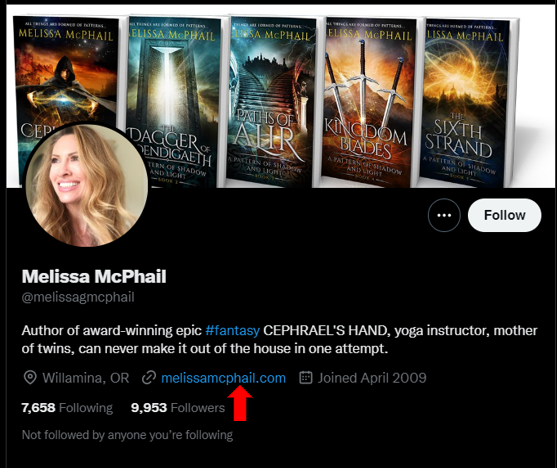Building the Perfect Author Website: A Step-by-Step Guide

Are you about to debut your first book? Or are you looking to boost your author platform to solidify your staying power?
In both cases, you must build an author website. This is because it will:
- Improve your author branding
- Show off your books and other work
- Engage with new and existing readers
But making an author website won’t happen overnight, even for the most tech-savvy authors.
Lucky for you, we’ve created websites for million-book-selling authors, rising indie stars, and many debut authors. That means we know what we’re talking about.
We’re going to guide you through the process of creating an author website that is professional and reflects you and your books.
Note: All the examples used are from websites we created for the authors mentioned.
1. Pick A Domain Name
Your domain name is the address of your website. In an ideal world, your domain name will be your author name.
This will make it easier for readers to find you online. Once they search for you, your website should be the first thing they see.
For example, one of our self-published author clients, Melissa McPhail used melissamcphail.com.
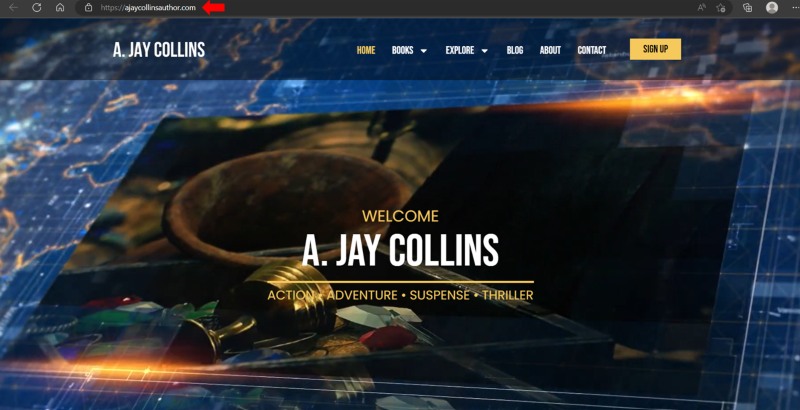
However, if your name is already taken, try adding your middle initial. For example, another of our authors, Thomas R. Weaver’s domain name: thomasrweaver.com.
You can also add something to differentiate like “author” or “writer.” For example, ajaycollinsauthor.com as seen in the above picture.
If you have a pen name such as T.A. White, the domain could be tawhiteauthor.com.
Note: Even if you’re getting a professional to build your author website, you should be the one to buy the domain name. Or at least your details should be used. If they do it for you, you should be kept up to date with all the processes, so you know what’s going on.
2. The Right Web Hosting Service
The next step in building an author website is getting a web hosting service to display it.
There are many web hosting services out there, but we recommend using Siteground or WPEngine.
It can be overwhelming when picking which web hosting service to use. Besides choosing a plan that fits your budget, consider these factors too:
- Different features: For example, features like the ability to link different email accounts and or some options have tools to help build an author website. See which features you value the most.
- Support and maintenance: Customer support is essential as you may encounter issues on your author website that you’d need assistance with. Be sure to see how their support services work.
3. Designing Your Author Website
It’s time to start designing your author website. You could go the DIY route and use a website builder tool. Or you could hire a professional web designer to do it all for you.
If you’re going solo: Wix or Squarespace are popular website builder tools you could try. And you don’t need to have any coding experience to use them!
With their designed templates and easy-to-understand mechanics, you can still have a professional author website…but it will take quite some time and effort to achieve.
Another DIY option we recommend is a self-hosted WordPress Site. It takes a little more work to set up but, unlike Wix or Squarespace, you’ll actually own your author website!
If you need help: You can hand over all the complicated techy work to an experienced web designer. You can look for a freelancer or agency to build your author website. Or you can use Upwork or 99designs to browse and find a web designer.
Remember these factors when choosing a theme or design for your author website:
- Readability: Content should have space to breathe and have easy-to-read fonts
- Genre and Brand: The color scheme, fonts, and design elements should be in service of your genre and brand. For example, cursive fonts will work best for some romance or fantasy genres.
- Navigation: Make sure your menu and your sections are easy to get around or your readers will get lost in your website.
4. Add Content
Just as you need writing inspiration for your books, you’ll need some website inspiration before you start. We’ll give you examples of content other authors have added on their author websites to get your creative juices flowing.
Consider how you can apply these techniques to your own author website:
About Page
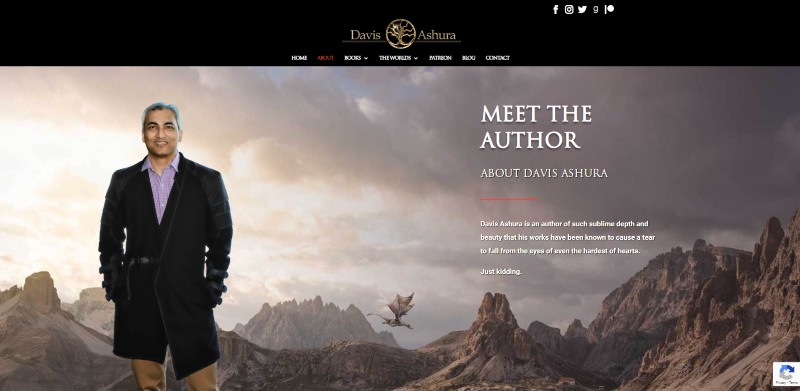
Also known as your author bio page, your About Page is used to share information about your journey as a writer. You want this to grab potential readers and give them an insight into your professional and personal life.
Be sure to pick a friendly photo of yourself that suits your genre and your brand.
For example, Davis Ashura’s About page works well as his intro grips the website visitor immediately, making them want to read on.
Books Page

Your Books Page is where all your published work can be viewed by fans and potential readers. Your book covers and book blurbs should be displayed in an easy-to-read way.
And don’t forget to include links to where readers can buy your books, for example, Amazon, Barnes and Noble, etc. It’s also a good idea to include information about any upcoming releases or pre-orders.
Note: If you have any upcoming releases or books for pre-order, make sure it’s displayed with the relevant information and promoted on your home page.
Blog Page

Blogging is a great way to engage with your audience. And there’s no better place to house a blog than your author website.
Besides updating readers on your book releases, you could blog about:
- Your author career
- Book reviews,
- Life updates
- Your hobbies and interests
For example, K.C. Ale’s Blog page has a fun layout that showcases all the blogs with interesting thumbnails to entice visitors to click and read. K.C. even wrote a small piece on the author website we designed for her!
Contact Page

As an author, nothing feels more rewarding than hearing what your fans have to say.
This is where your Contact Page comes in. It’s another way to engage with your readers and hear from them.
This page should have your email address or a contact form for readers to type their message in.
Also, you should let readers know which other channels they can follow you on. Mention and provide links to your social media profiles like your Facebook Author Page. See the example below

Reviews and Social Proof

Show off your best reviews for each book on your book page and your best general reviews on your home page. Be sure to share your awards or if you’ve been featured on well-known platforms relevant to your books.
For example, Tim Sullivan has reviews from the Daily Mail and The Times.
5. Setting Up Your “Reader Magnet”
A reader magnet is something you offer to readers in exchange for their email addresses.
You could offer a short story, a sample chapter, or bonus content like downloadable wallpapers, guides, etc.
Your reader magnet aims to encourage readers to sign up for your author newsletter.
Once they’re on your email list you can keep them engaged with high-quality content while promoting your work. This is your key to growing your readerbase and building a loyal community.
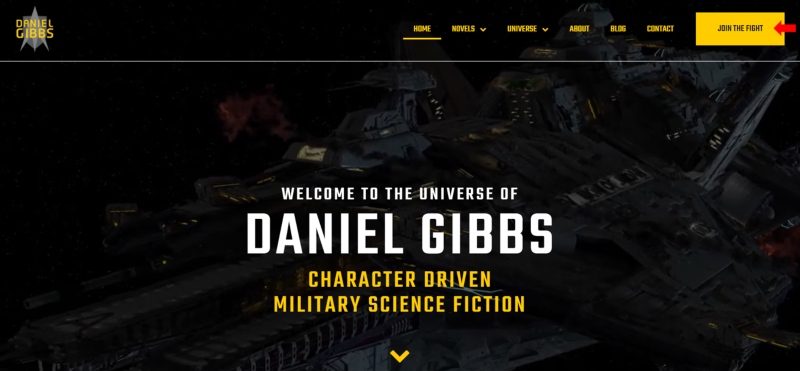
Here’s how you set it up:
- Add a button in the top right of your website navigation saying “Start Reading” or “Free” or even something like “Join the Fight” if you write military fiction.
- Create a page that this sign-up button will go to that will showcase your reader magnet.
- Add a section for the reader magnet at the bottom of every page.
Daniel Gibbs’ reader magnet is excellent as it stands out while also falling into the theme of the website, as seen above.
6. Your Email Marketing Platform
Before you start collecting these email addresses from your reader, you need to set up your email marketing. Follow these steps:
Pick a Platform
Popular ones include Mailchimp, Constant Contact, and MailerLite. Check out their plans and features to see which ones fit your needs.
Build your email list
You need to set up an email list for your subscribers’ email addresses. Most email marketing platforms have instructions on how to do it.
Create the opt-in form
Your opt-in form goes hand in hand with your reader magnet, allowing interested readers to input their email addresses and join your email list.
To get your opt-in form on your website, copy and paste the code from your email marketing service provider into the appropriate location on your website coding.
Customizing the opt-in form

To give your opt-in form a personal touch, customize it to match your author website’s design.
For example, Daniel Gibbs’ Opt-in form follows suit with the rest of his website while also giving a great offer in exchange for the visitors’ emails.
Testing the opt-in form
Be sure to test it by signing up a friend’s email or your email to the email list. Once you receive the welcome email, you’re good to go.
7. Promote Your Author Website
Now that you’ve built your author website, it’s time to spread the word! Here are a few ways to promote your website:
- Social media: Add your author website link to your social media profiles (or even post about it), just as Melissa McPhail has done in the above picture.
- Email signature: Add your author website link below your email signature for industry professionals and readers to click on.
- Business cards: Be sure to have your author website address on your business cards.
- Bookstores and libraries: If a local bookstore or library sells your books, share your author website with them. Ask if they could share your author website on their website or with their customers.
- Events: When you’re attending events like speaking engagements, don’t forget to ask readers to check out your author website if they’re interested in learning more about you.
8. Author Website Maintenance

When you’re done building your author website, the work isn’t over. You have to keep it up to date.
Use the below techniques to keep your author website fresh and engaging:
- New content: Add a new blog, refresh your bio picture, or even change your intro banner to suit an upcoming release.
- Upcoming books: If you want your new releases to get attention, add them as Charlie Cochet has done in the above picture.
- Monitor your website: Don’t forget to check links and all your pages to ensure everything still works as intended
- Analytics: Use tools like Google Analytics, to track your site’s traffic and monitor how readers use your author website. This will show you what’s working and what you can improve.
Ready To Get Started?
Building an author website is a necessity for any author wanting to establish their brand and build a community. And when it’s done right, you’ll have a professional online presence that wows your readers and impresses publishing professionals.
To make these steps even easier, we can take some of the load off! If you’re looking for a more budget-friendly website with premium support, or if you want the entire website done for you, Rocket Expansion can help.
Just fill in this inquiry form and you’ll be one step closer to achieving your author website dream.
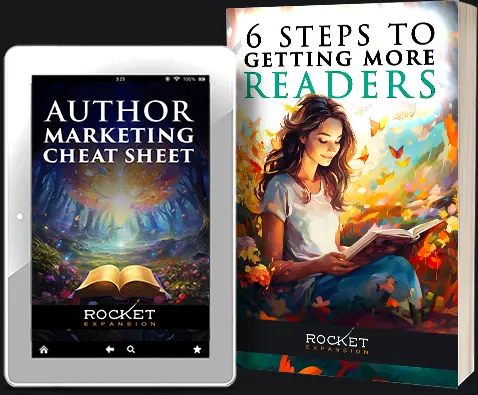
Want help with your author marketing? Get our FREE ebook and cheat sheet: 6 Steps To Getting More Readers.
By subscribing, you agree to get emails from me, Matt Ziranek. I’ll respect your privacy and you can unsubscribe any time.

